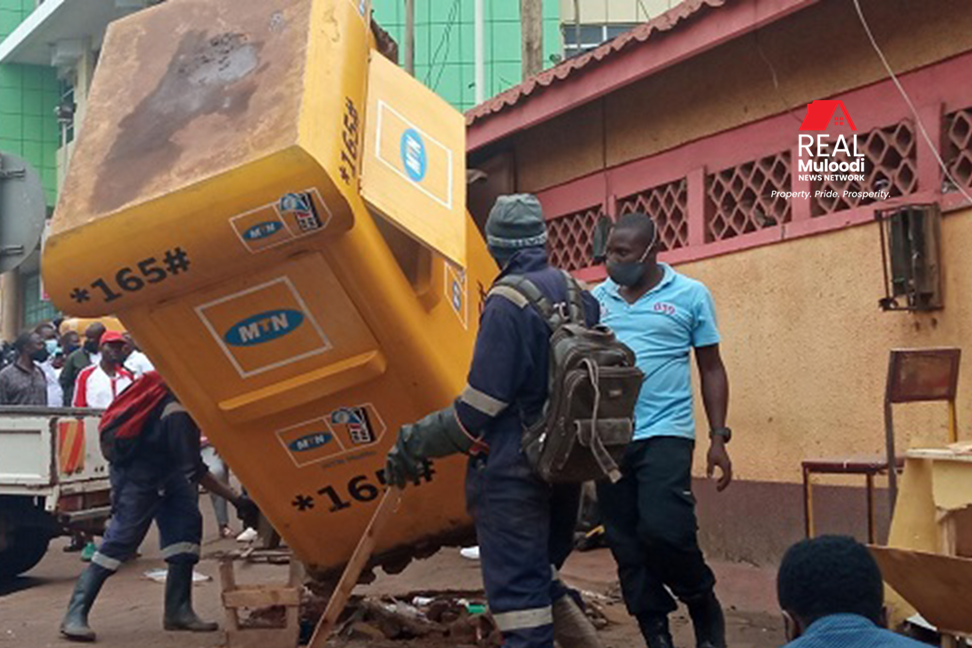UGANDA, Kampala | Real Muloodi News | The government has issued a directive for the demolition of illegal kiosks nationwide, focusing initially on Jinja City.
The crackdown on these structures, which occupy service lanes, is expected to impact many youth entrepreneurs.
In the end of May, Dr. Joseph Muvawala, Executive Director of the National Planning Authority, addressed the issue in a letter to the Permanent Secretaries of the Ministries of Local Government and Lands, Housing, and Urban Development.
Dr. Muvawala highlighted the illegal construction of kiosks in urban service lanes across the country, including Jinja City.
The letter specifically instructed the Jinja City Town Clerk to demolish illegal kiosks obstructing service lanes, starting with those near St. James Secondary School and Oil Com fuel station in the East, as well as commercial buildings and TotalEnergies fuel station in the West.
Dr Muvawala’s directive emphasised that these service lanes must fulfil their intended functions.
“I have observed with concern that the above physical development plans have not been adhered to in Jinja City and other urban areas,” Dr. Muvawala wrote in the letter dated May 23, 2024.
“For instance, in Jinja City, the service lanes meant to serve St. James Secondary School and Oil Com petrol station in the East and commercial buildings and Total Petrol Station in the West have been illegally built with metallic kiosks, an act that defeats the purpose for which the service lanes were provided.”
Dr. Muvawala also noted that the illegal kiosks negatively affect business performance in the central market, as vendors occupy these unauthorised structures.
The directive has sparked a response from the youth in Jinja, who claim that some city leaders are influenced by business proprietors and landlords benefiting from the kiosks.
Issa Muhwezi, a leader of the Kuyiliba Development Association, stated that the kiosks are constructed legally and with the knowledge of the Jinja City Council.
“We are here legally and trying to solve and assist some of our colleagues who are rendered jobless on the streets; these kiosks are going to generate revenue for the city and will employ over 300 people directly and indirectly,” Muhwezi said.
Muhwezi emphasised that the kiosks would reduce unemployment and help those whose goods were confiscated by enforcement teams.
Henry Akram, another youth leader, mentioned that funds from government projects like Emyoga, Youth Livelihood Fund, and Parish Development Model (PDM) have been used to establish these kiosks.
“We hope to recoup some returns from these investments,” Akram added.
Ezra Naika, a second-hand shoe dealer, said the youth have presented a creative solution with standard kiosks but feel their requests for allocation have not been considered.
Musa Magomu, a fruit vendor since 1993, noted that the kiosks would cater to low-income customers who cannot afford supermarkets and high-end shops.
When asked about implementing Dr. Muvawala’s directives, Jinja City Town Clerk Edward Lwanga clarified that the letter was addressed to the Permanent Secretaries, not directly to him.
“The letter was written to the Permanent Secretary in the Ministry of Local Government and Permanent Secretary of the Ministry of Lands, Housing, and Urban Development, not to the Town Clerk. I cannot comment on a letter written to my bosses,” Lwanga stated.
Lwanga mentioned that he had already given notice and informed the police for backup support, indicating that higher authorities would take further action.
The directive comes amid growing concerns over urban planning and land use in Uganda. The proliferation of illegal kiosks has raised issues related to congestion, safety, and the effective use of public spaces.
Jinja City, a key urban centre in Uganda, has experienced significant growth and development. However, this growth has also brought challenges, including the unauthorised construction of kiosks and other structures.
The government’s directive aims to address these issues and ensure that urban planning standards are upheld.
The involvement of various stakeholders, including local government authorities, business owners, and youth groups, reflects the complexity of urban development challenges.
Dr. Joseph Muvawala, Executive Director of the National Planning Authority, emphasised the importance of adhering to physical development plans. “The construction of illegal kiosks defeats the purpose for which service lanes were provided,” he stated.
Issa Muhwezi, leader of the Kuyiliba Development Association, highlighted the economic benefits of the kiosks. “These kiosks are going to generate revenue for the city and will employ over 300 people directly and indirectly,” Muhwezi said.
Henry Akram, a youth leader, mentioned the funding sources for the kiosks. “We got money from government projects like Emyoga, Youth Livelihood Fund, and Parish Development Model (PDM),” Akram explained.
Ezra Naika, a second-hand shoe dealer, expressed frustration over the lack of consideration for their development ideas. “We have presented a creative solution with standard kiosks, but our requests for allocation have not been considered,” Naika said.
Jinja City Town Clerk Edward Lwanga clarified his position regarding the directive. “The letter was written to the Permanent Secretaries, not to the Town Clerk. I cannot comment on a letter written to my bosses,” Lwanga stated.
READ MORE LIKE THIS:
Protest Erupts as Kiosk Owners Challenge Mbarara City Council’s Eviction Directive
Kiosk Owners Want Stall Allocation in Mbarara Central Market Halted



